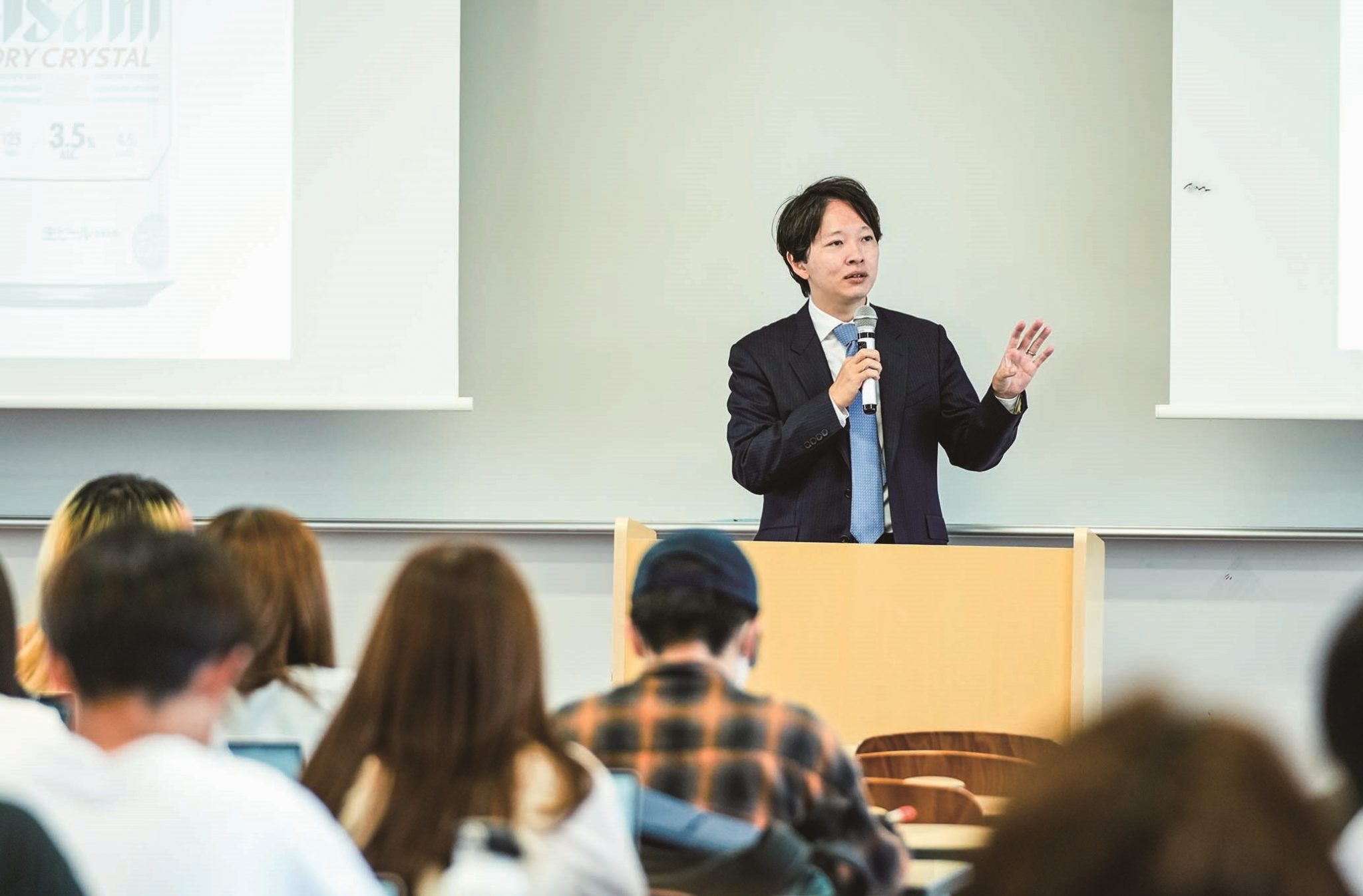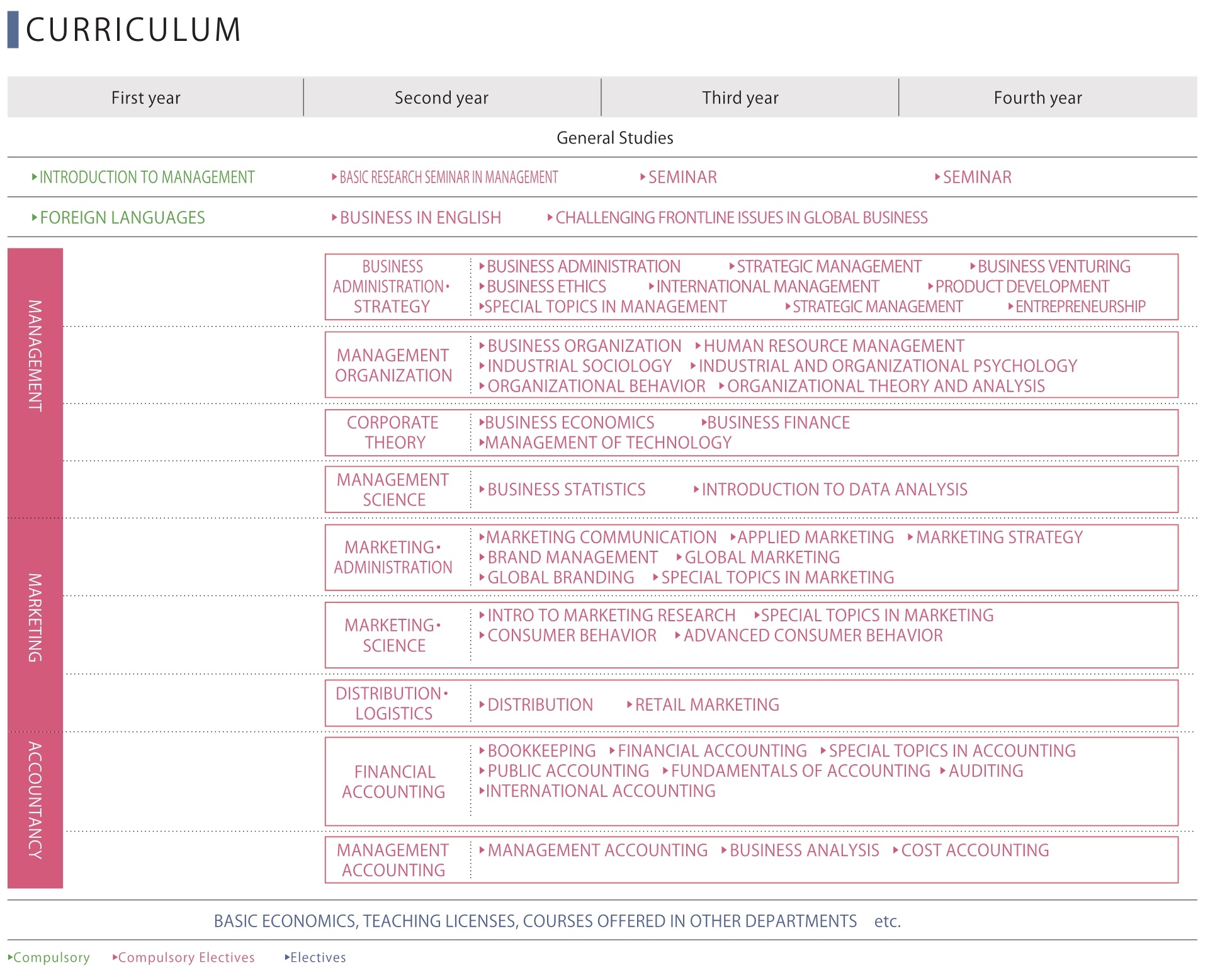Department of Management


Department Features
Students in the Department of Management study advanced specialized knowledge related to corporate management, focusing on the three core areas of business management, marketing, and accounting. At the same time, we aim to develop people who can make rational decisions in the management arena by understanding ideal corporate management and the role of corporations in relation to local and global society.
Since corporate management requires a broad perspective that encompasses not only the organization itself but also society at large, the Department of Management encourages students to take courses in other departments and faculties. In addition, it offers various language courses and study-abroad programs, and specialized education through a program in English, to build a foundation for acting on the international stage.
The Department of Management offers a degree program with the SPSF (Sophia Program for Sustainable Futures) and instruction in English.
Curriculum
In the first year, students learn how to study business administration (problem identification, collection and analysis of literature, information, and data, etc.), and in the second year, they take specialized courses in stages. The three specialized courses are divided into three areas: Business Administration, which covers business management, strategy, and corporate organization; Marketing, which covers markets, consumers, and distribution; and Accounting, which is essential for quantitative analysis of companies. Students will take courses based on their interest and goals to learn management in a structured manner. In the third year, students begin taking seminars to deepen their specialized knowledge. They also have the freedom to broaden their perspectives through economics and law courses, and develop an international perspective via the English for Business Administration Special Program.
as of 2022
* Please refer to the syllabus for more information on the courses.
Course Examples
Students can build a curriculum for their own unique future, choosing freely from basic to highly specialized subjects in either Japanese or English.
- Strategic Management
Students will deepen their understanding by learning the basic concepts of management strategy, focusing on company-wide strategy, which covers business development of the entire company, and competitive strategy, which deals with development at the business level, and then applying these concepts to actual corporate cases for consideration and discussion.
- Consumer Behavior
This course examines the process of purchase decision-making and the psychological functions (cognition and memory) of individuals that influence purchase behavior from a behavioral science perspective, and deepens understanding of consumer behavior, which is essential for building marketing strategies.
- Financial Accounting
The purpose of financial accounting is to report corporate activities in financial statements to parties outside the company. In lectures, students will come to grasp the basics of the theory and system, and acquire the ability to analyze the actual business conditions of a company.
- Entrepreneurship
Entrepreneurship is nowadays considered to be one of the key drivers of economic prosperity and job creation around the world. As such, demand for entrepreneurial knowledge and skills is on the rise. Across two courses, Entrepreneurship introduces key concepts, processes, and the wider context of entrepreneurship (especially innovative and growth-oriented entrepreneurship), before exploring how various types of entrepreneurship and innovation can catalyze social change and develop potential solutions to socio-economic challenges.
- Global Branding
More than simply being a logo or a brand’s visual appearance, branding has become a strategic cornerstone by which corporate values and identity are communicated to consumers and other stakeholders. This course introduces core concepts in brand development and management both locally and globally, and requires students to critically engage with how branding can be applied to products, organizations, places, and people.
- International Accounting
Many jurisdictions around the world require all or most listed companies to use International Financial Reporting Standards (IFRS). Amid this new trend in the accounting environment, understanding so called “global accounting standards” and their effects on listed companies is vital. This course teaches both the historical development of the International Accounting Standards (IAS) and IFRS, and the current economic consequences of adopting these standards.
Available Teaching Licenses and Subjects
- First Category Teaching license for High School (Business)
Curatorial courses are available.
Educational Objectives and Policies
-
To impart high-level expertise and broad general knowledge while cultivating a capacity to understand and practice management using a range of approaches in actual social engagement.
-
To produce individuals who understand management in its local and global social contexts, and who can contribute not only to corporate management but also to local and international communities through rational decision-making grounded in specialist knowledge
-
The Department of Management sets standards for the skills and knowledge students should acquire before graduation as follows. Those who fulfill the graduation requirements shall be deemed to have acquired these qualities and will be awarded a diploma.
- The knowledge and skills required to appropriately analyze management environments that are undergoing globalization and are increasing in complexity.
- The ability to understand and explain the approaches and concepts of Management Studies as well as specialized knowledge
- The ability to efficiently collect and process complex and diverse information and take the lead in solving issues challenging real society.
- The ability to respect differences and diversity, engage in open and fair discussion and communicate information, in order to make appropriate decisions under strict constraints.
- The ability to acquire high-level communication skills and contribute to problem-solving by taking the initiative in an international forum.
-
With an aim to achieve the Diploma Policy, the Department of Management constitutes its curriculum
as follows:- Facilitate freshmens’ acquisition of the learning skills, fundamental understanding of specialized knowledge, communication skills, logical thinking, and social ethics required to promote specialized learning in the Compulsory Courses, “Introduction to Management Ⅰ” and “Introduction to Management Ⅱ”.
- Facilitate the students’ deepening of expertise in Specialized Courses and Seminars, as well as their acquisition of the ability to solve issues challenging society today.
- Aim to foster a self-motivated attitude towards learning and improve communication skills through “Introduction to Management I” for freshmen, “Basic Research Seminar on Management” for sophomores, and Seminars for juniors and seniors, and also through small-group courses offered throughout the four years of enrollment.
- Offer courses taught by experienced business managers and practitioners that foster a realistic and practical sense of management and/or teach business in practice.
- Foster students’ acquisition of business communication skills through English-taught courses taught by native speakers such as “English for Business Management” and “Special Topics in Management”, so that students can succeed globally.
- Offer Elective Compulsory Courses that aim to understand specialized knowledge in English.
- Establish a Faculty of Economics, Management in English Program that provides certification to students that have fulfilled certain conditions.
-
The Department of Management aims to foster individuals who can systematically study highly professional expertise regarding corporate business management activities and can simultaneously understand business management in the context of global society and contribute to society by making management decisions.
- We seek students interested in the various issues challenging society and are motivated to play an active part in dealing with them.
- We seek students with the Japanese and foreign language skills required to logically analyze and understand social phenomena from a multidimensional perspective, a grounding in social studies, including history, and excellent logical thinking skills.
- We seek strongly motivated students who will be future leaders in both commercial and non-profit organizations and projects in Japan and overseas.
Faculty Members
Masahiro ISHII Professor
Hideyuki TAKENOUCHI Professor
Nobuko HOSOGAYA Professor
Agata KAPTURKIEWICZ Associate Professor

Jyunko JINUSHI Assistant Professor
Mariko NAKAGAWA Assistant Professor

